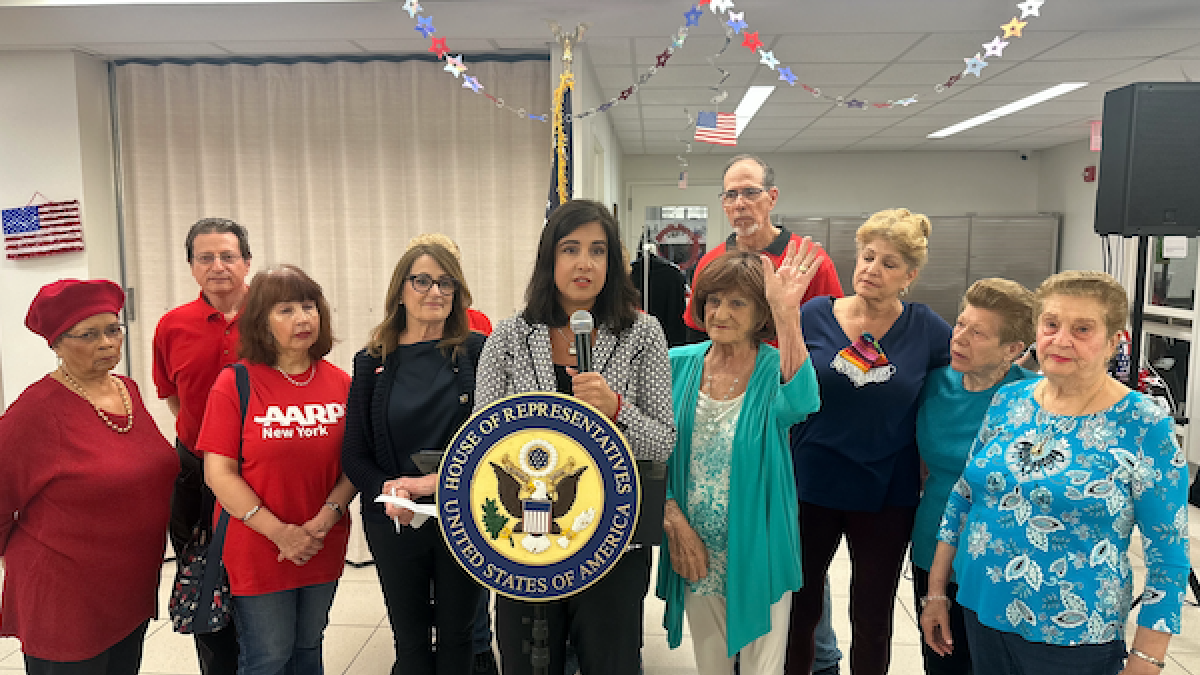Malliotakis Rallies Support for Senior Tax Relief

(STATEN ISLAND, NY) - Congresswoman Nicole Malliotakis was joined by Beth Finkel, State Director of AARP New York, Marie Santangelo, leader of all Staten Island AARP Chapters, and local senior citizens at the New Dorp Beach Friendship Club to rally support for her effort to reduce taxes on Social Security income for seniors. As a member of the House Ways & Means Committee, Malliotakis has played a key role in negotiations and is working to build momentum in Washington to pass this big, beautiful bill as part of the upcoming budget reconciliation tax package.
As tax package negotiations continue, Malliotakis is working to include key provisions of her legislation in the upcoming reconciliation bill including:
H.R. 1130, The Bonus Tax Relief for America's Seniors Act, and would amend the Internal Revenue Code of 1986 to increase the additional bonus deduction for seniors age 65 and over from $1,950 to $5,000 for single filers, and from $3,100 to $10,000 for married couples. On average, this bipartisan legislation would reduce federal taxes by $2,100 for married couples filing jointly earning $85,000 per year.
Increasing the SALT Cap, the current $10,000 cap on State and Local Tax (SALT) deductions has disproportionately impacted seniors and middle-class families in high-tax states like New York. Malliotakis is fighting to increase the deduction to provide meaningful relief to hardworking taxpayers burdened by high city & state taxes, and to ensure the Alternative Minimum Tax does not return.
“As we work to finalize the details of our tax relief package, I remain hopeful that key provisions of my legislation will be included in our one big, beautiful bill to reduce the tax burden on our seniors and muddle-class families in our community,” said Rep. Nicole Malliotakis. “Too many seniors are being forced to stretch their retirement savings further than ever before. After a lifetime of hard work and paying taxes, they deserve to keep more of their Social Security and retirement income without Uncle Sam reaching into their pockets again.”
"This bill is a clear recognition of both the financial pressures facing older Americans and the additional cost of the taxation of Social Security benefits, the largest source of income for most seniors. It also reflects a bipartisan understanding that our tax code should better support those who have worked hard, earned benefits, and contributed to our economy throughout their lives. By allowing more older taxpayers to keep more of their income, this legislation would improve retirement security and support independence and dignity in aging,” said Nancy A. LeaMond, AARP Executive Vice President and Chief Advocacy and Engagement Officer.
Malliotakis is also sponsoring other measures to ease the burden on seniors, including:
H.R. 1129, The Tax Relief Unleashed for Seniors by Trump (TRUST) Act, would increase the amount of income that is tax exempt and index the threshold to inflation, allowing seniors to keep more of their benefits. Malliotakis' legislation would double current exempt income from $25,000 to $50,000 for single filers and from $32,000 to $64,000 for married couples age 65 and older.
H.R. 2266, The Reducing Excessive Taxation and Inefficiencies by Reforming Elder Exemptions to Support Fairness, Inflation Relief, and Simpler Taxes Act (RETIREES FIRST Act) aimed at modernizing outdated Social Security tax thresholds to deliver tax relief to middle-class retirees.
Today, nearly 56% of retirees pay taxes on their Social Security benefits, compared to less than 10% in 1984 when the Social Security exemptions were first established. As this figure is projected to rise further, Malliotakis is taking action having introduced legislation to raise the provisional income thresholds to $34,000 for single filers and $68,000 for married filers—up from the current levels of $25,000 and $32,000, respectively. The legislation would exempt most middle-class retirees from paying taxes on their Social Security benefits by reducing their tax burden.
The income thresholds for taxation of benefits have remained unchanged since first established by Congress in 1984. At the time, less than 10 percent of beneficiaries paid federal income tax on their benefits, but because wages have increased, the proportion of beneficiaries who must pay federal income tax on benefits has risen over time.
|
|